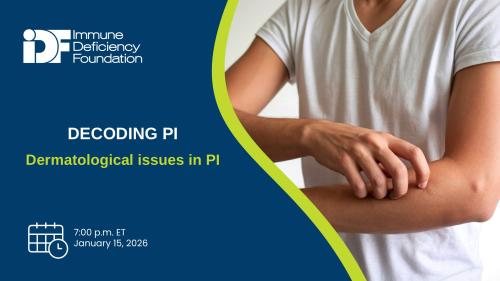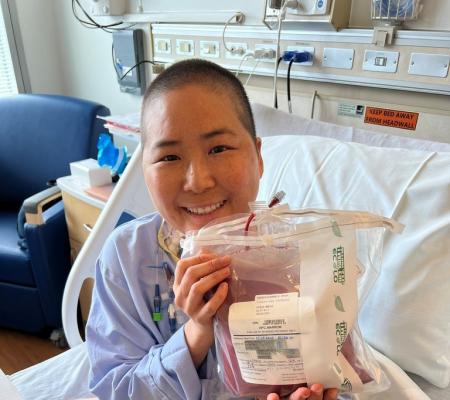
-
Understanding primary immunodeficiency (PI)

Understanding PI
The more you understand about primary immunodeficiency (PI), the better you can live with the disease or support others in your life with PI. Learn more about PI, including the various diagnoses and treatment options.
-
Living with PI
-
Addressing mental health
-
Explaining your diagnosis
- General care
- Get support
- For parents and guardians
-
Managing workplace issues
- Navigating insurance
-
Traveling safely

Living with PI
Living with primary immunodeficiency (PI) can be challenging, but you’re not alone—many people with PI lead full and active lives. With the right support and resources, you can, too.
-
Addressing mental health
-
Get involved

Get involved
Be a hero for those with PI. Change lives by promoting primary immunodeficiency (PI) awareness and taking action in your community through advocacy, donating, volunteering, or fundraising.
-
Advancing research and clinical care
-
Research Grant Program
-
Consulting immunologist
-
Diagnosing PI
-
Getting prior authorization
-
Clinician education
-
Survey research
-
Participating in clinical trials

Advancing research and clinical care
Whether you’re a clinician, researcher, or an individual with primary immunodeficiency (PI), IDF has resources to help you advance the field. Get details on surveys, grants, and clinical trials.
-
Research Grant Program
For many people with primary immunodeficiency (PI), infections are not the only diagnoses they’re managing. Those with PI may also experience allergies, asthma, autoimmunity, chronic inflammation, and cancer—all stemming from the underlying disruption to the immune system.
The Immune Deficiency Foundation's patient survey data has consistently found allergies and asthma to be two of the most reported co-occurring conditions in individuals with PI. Both are quite common in the general population as well. However, a study of individuals in the United States Immunodeficiency Network (USIDNET) registry found that 68% of those with PI also had allergies and/or asthma, suggesting that these diagnoses are even more common in the PI population.
Allergies are an immune system overreaction to substances like pollen, insect venom, foods, or medication. Asthma (or narrowing of the airways in the lungs caused by inflammation) most often occurs as an allergic reaction. The USIDNET study found that the top three most common allergic reactions in those with PI in the U.S. were asthma, eczema (inflammation of the skin, also known as atopic dermatitis), and anaphylaxis (a life-threatening, systemic allergic reaction) caused by medication or food. Further analysis found that, among those with PI, individuals with antibody deficiencies or combined immune deficiencies (CIDs) are most prone to allergies and asthma.
Autoimmunity and chronic inflammation encompass a large set of conditions that are also associated with PI. These conditions happen when the immune system either makes antibodies or T cells that mistakenly recognize healthy parts of the body (autoimmunity) or reacts with inflammation when there is no infection or injury and damages healthy tissue (chronic inflammation). For some forms of PI, such as STAT 3 gain-of-function, autoimmunity and chronic inflammation are the primary symptoms.
In a study of the French national PI registry, autoimmune cytopenias, or the destruction of different types of blood cells, were the most frequent co-occurring autoimmune diagnoses across many different types of PI. A study of U.S. insurance claims found that those with PI on immunoglobulin (Ig) replacement therapy were 7.8 times more likely to be diagnosed with rheumatoid autoimmune conditions (for example, rheumatoid arthritis, scleroderma, or systemic lupus erythematosus) than people without PI who were not on Ig. In addition, inflammatory bowel disease (IBD) is well-documented in chronic granulomatous disease (CGD), and many people with common variable immune deficiency (CVID) experience colitis (inflammation of the colon) or enteropathy (inflammation of the small intestines) that mimics IBD or celiac disease. These studies demonstrate that autoimmune and inflammatory conditions co-occur frequently and across many different types of PI.
Cancer is another co-occurring diagnosis for many with PI that has roots in immune system disruption. Cancer is when abnormal cells grow uncontrollably and invade healthy tissue. Typically, the immune system identifies and eliminates abnormal cells. When the immune system either doesn’t recognize or can’t get rid of these cells, they can develop into cancer. In addition, individuals with types of PI like X-linked lymphoproliferative (XLP) syndrome are very prone to viral infections that directly cause cells to become cancerous. Finally, several types of PI, such as CVID, can cause lymphoproliferation, or the overproduction of B or T cells, which sets the stage for cancer.
In general, lymphoma and leukemia, which both develop from abnormal white blood cells, are the most common types of cancers that develop in people with PI. However, those with chronic inflammation in particular tissues, such as individuals with CVID and GI inflammation, may also have an increased risk of developing cancers in those tissues.
Allergies, asthma, autoimmunity, chronic inflammation, and cancer represent some of the most notable co-occurring diagnoses in individuals with PI but are by no means the only ones. Being knowledgeable about co-occurring diagnoses can help you and your healthcare provider gauge your risk, recognize symptoms, and get early treatment.
2026 PI Conference
Join us June 25-27, 2026, in San Antonio, Texas, for a transformative experience where stories connect, voices unite, and journeys inspire. No matter where you are in your primary immunodeficiency journey, access expert-led education, meaningful connections, and cutting-edge insights from world-renowned immunologists.
Register nowTopics
This page contains general medical and/or legal information that cannot be applied safely to any individual case. Medical and/or legal knowledge and practice can change rapidly. Therefore, this page should not be used as a substitute for professional medical and/or legal advice. Additionally, links to other resources and websites are shared for informational purposes only and should not be considered an endorsement by the Immune Deficiency Foundation.
Related resources
Sign up for updates from IDF
Receive news and helpful resources to your cell phone or inbox. You can change or cancel your subscription at any time.





The Immune Deficiency Foundation improves the diagnosis, treatment, and quality of life for every person affected by primary immunodeficiency.
We foster a community that is connected, engaged, and empowered through advocacy, education, and research.
Combined Charity Campaign | CFC# 66309




